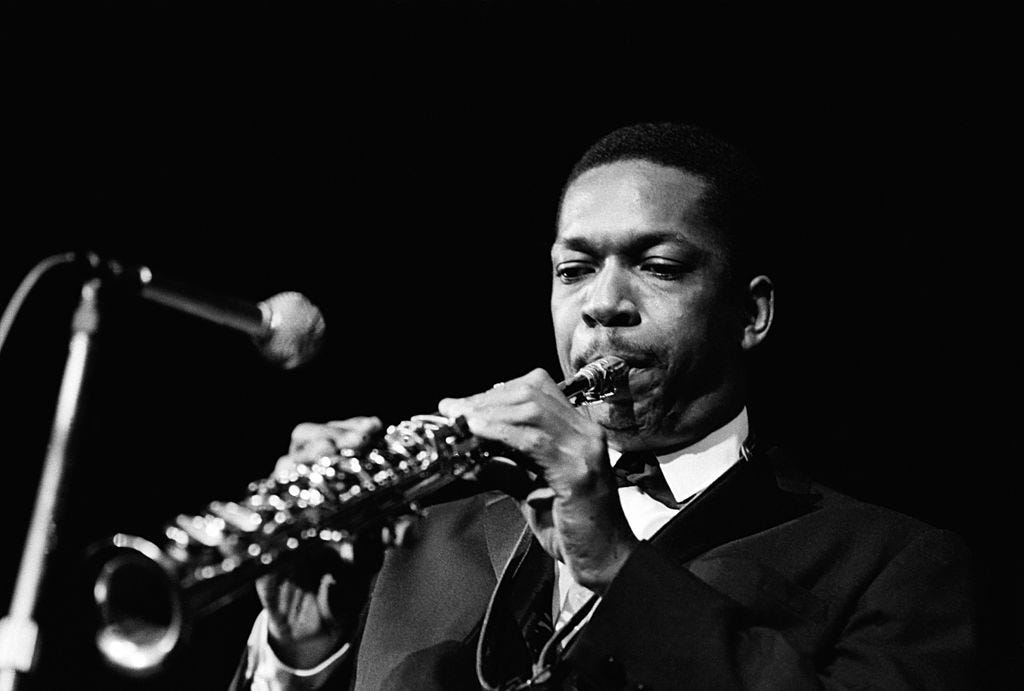The Creative Urge
Jazz saxophonist John Coltrane on the force that drives an artist
This fantastic letter can be found in the book, Letters of Note: Music, copies of which can be ordered here. The reading by Clarke Peters is taken from the accompanying audiobook.
As a saxophonist, bandleader and composer, John Coltrane will forever remain a giant in the world of jazz, a community that owes so much to his innovative, instantly recognisable sound. Born in North Carolina on this day in 1926, it was a stint in the Miles Davis band in the 1950s that forced people to take notice of his talents, but it was his solo releases—including his 1960 masterpiece, Giant Steps—that truly thrust him into the spotlight and etched his name into the very fabric of jazz history. Two years after the release of Giant Steps, Coltrane was sent, by the editor-in-chief of Downbeat magazine Don DeMichael, a copy of Music and Imagination, a book containing a series of lectures delivered by composer Aaron Copland at Harvard University in 1951. This letter was Coltrane’s response.
June 2, 1962
Dear Don,
Many thanks for sending Aaron Copland’s fine book, “Music and Imagination.” I found it historically revealing and on the whole, quite informative. However, I do not feel that all of his tenets are entirely essential or applicable to the “jazz” musician. This book seems to be written more for the American classical or semi-classical composer who has the problem, as Copland sees it, of not finding himself an integral part of the musical community, or having difficulty in finding a positive philosophy or justification for his art. The “jazz” musician does not have this problem at all.
We have absolutely no reason to worry about lack of positive and affirmative philosophy. It’s built in us. The phrasing, the sound of the music attest this fact. We are naturally endowed with it. You can believe all of us would have perished long ago if this were not so. As to community, the whole face of the globe is our community. You see, it is really easy for us to create. We are born with this feeling that just comes out no matter what conditions exist. Otherwise, how could our founding fathers have produced this music in the first place when they surely found themselves (as many of us do today) existing in hostile communities when there was everything to fear and damn few to trust. Any music which could grow and propagate itself as our music has, must have a hell of an affirmative belief inherent in it. Any person who claims to doubt this, or claims to believe that the exponents of our music of freedom are not guided by this same entity, is either prejudiced, musically sterile, just plain stupid or scheming. Believe me, Don, we all know that this word which so many seem to fear today, “Freedom,” has a hell of a lot to do with this music.
You know, Don, I was reading a book on the life of Van Gogh today, and I had to pause and think of that wonderful and persistent force—the creative urge. The creative urge was in this man who found himself so much at odds with the world he lived in, and in spite of all the adversity, frustrations, rejections and so forth—beautiful and living art came forth abundantly... if only he could be here today. Truth is indestructible. It seems history shows (and it’s the same way today) that the innovator is more often than not met with some degree of condemnation; usually according to the degree of his departure from the prevailing modes of expression or what have you. Change is always so hard to accept. We also see that these innovators always seek to revitalize, extend and reconstruct the status quo in their given fields, wherever it is needed. Quite often they are the rejects, outcasts, sub-citizens, etc. of the very societies to which they bring so much sustenance. Often they are people who endure great personal tragedy in their lives. Whatever the case, whether accepted or rejected, rich or poor, they are forever guided by that great and eternal constant—the creative urge. Let us cherish it and give all praise to God. Thank you and best wishes to all.
Sincerely,
John Coltrane
Letter from John Coltrane to Don DeMichael, 2nd June 1962 © Jowcel Music, LLC. Used by permission / All rights reserved.




Such an exceptionally beautiful letter. One to carry in your head and your heart like a cherished memory.
Wow. This is a gorgeous, beautifully-written letter full of intelligence, insight, revelation and potent truths. "Freedom" and "The Creative Urge": Yes!!! Funny, I was just reading Van Gogh's collected letters to his brother Theo. Powerful. I know what Coltrane means when he talks about VG being against the grain and not fitting in with convention. Ditto what he said about innovators and how they're often ostracized for a while until things shift in the culture. Reminds of Steve Jobs, a man no one saw doing what he did, who changed the face of contemporary society radically. I love how Trane commented on ultimate freedom and jazz being a creative portal to that freedom. I've been listening to JC's music for a long time. He's one of the few artists I can play while I'm writing. What wit and brilliant sense of awareness. I started listening to jazz in my early twenties, 18 years ago, after reading Jack Kerouac's "On the Road." Kerouac (another artist who shifted the culture and chased freedom) was considered the beat writer who "wrote like jazz." Anyway. Superb material here. Thank you for sharing. Great way to start the day. https://michaelmohr.substack.com